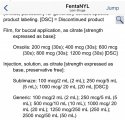I don't think pharmacy staff was sending the meds. It sounds like hospital had meds dispensed by some machine. When it wouldn't dispense that much fentanyl, Dr. used an "override" function to get it. At least that's my understanding from reading the reports, because they keep mentioning drug dispensing machines.
Agreed.
Was there a way that the doctor circumvented the normal protocols and safeguards?
Most hospital these days have the computer driven medication dispensing systems that allow qualified staff to "pull" the meds. The system documents among other data: exact time, amount dispensed, number of vials supposed to be present, patient to receive medicine, and staff member withdrawing. Controlled substances such as narcotics had to reconcile with the amount scanned at bedside as given to the patient, as well as the "wasted" amount. Such a system is supposed to decrease medication errors--unintentional or intentional.
Most systems of this nature would presumably include what is meant to be multiple checks by multiple staff to prevent this type of event:
1) the doctor putting the order in the computer (override automatically triggered by a dosage out of range and response required for the reason to override before allowing the doctor to electronically sign the order)
2) the pharmacy receiving the order (electronically) and having a "hard stop" that that they must verbally confirm with the doctor the reason for the "out of range dosage" along with the time or multiple times recorded that the doctor was contacted to confirm the reason for "override"
3) the nurse that retrieves the meds from the medication dispensing system generates another notification of "out of range" dosage requiring an override and a reason for dispensing the medication that is out of normal range before the system will dispense the medication
4) and again, when giving the meds: scanning the patient and medicine another "override" triggered that warns that the medication dose is out of range and must have a reason documented for the override.
5) after the fact, most hospitals would have some department whether risk management, pharmacy, or the unit manager that reviews and monitors the overrides, unreconciled narcotic wastes, and other anomalies. This is required in most states. Usually the reports would be run daily, but possibly weekly, or monthly.
Just wondering how so many overrides could go unnoticed with so many associated deaths for so long?
Every override is meticulously documented by the computer. Doctors or nurses with multiple overrides would raise red flags in most hospitals, even in 2013. Pharmacy would notice an unusual pattern of medication depletion at a greater than expected rate. Most hospitals rigorously control medication supply and cost.
For a doctor to instigate the process of overriding the medication system, pulling the meds, and administering them to his victims , it wouldn't be that easy. Someone had to document these huge dosages administered and the reason why. What were the reasons that he, pharmacy, and the nurses listed for the override? Did they all agree on the reason for the override of such large doses? Were the nurses and pharmacy staff too intimidated to say anything or complicit that certain patients shouldn't live?
Notably absent from culpability was the company that sold the hospital the computer medication dispensing system and medication administration software. Apparently, there wasn't a glitch in the programming that allowed this to happen unnoticed.
MOO




